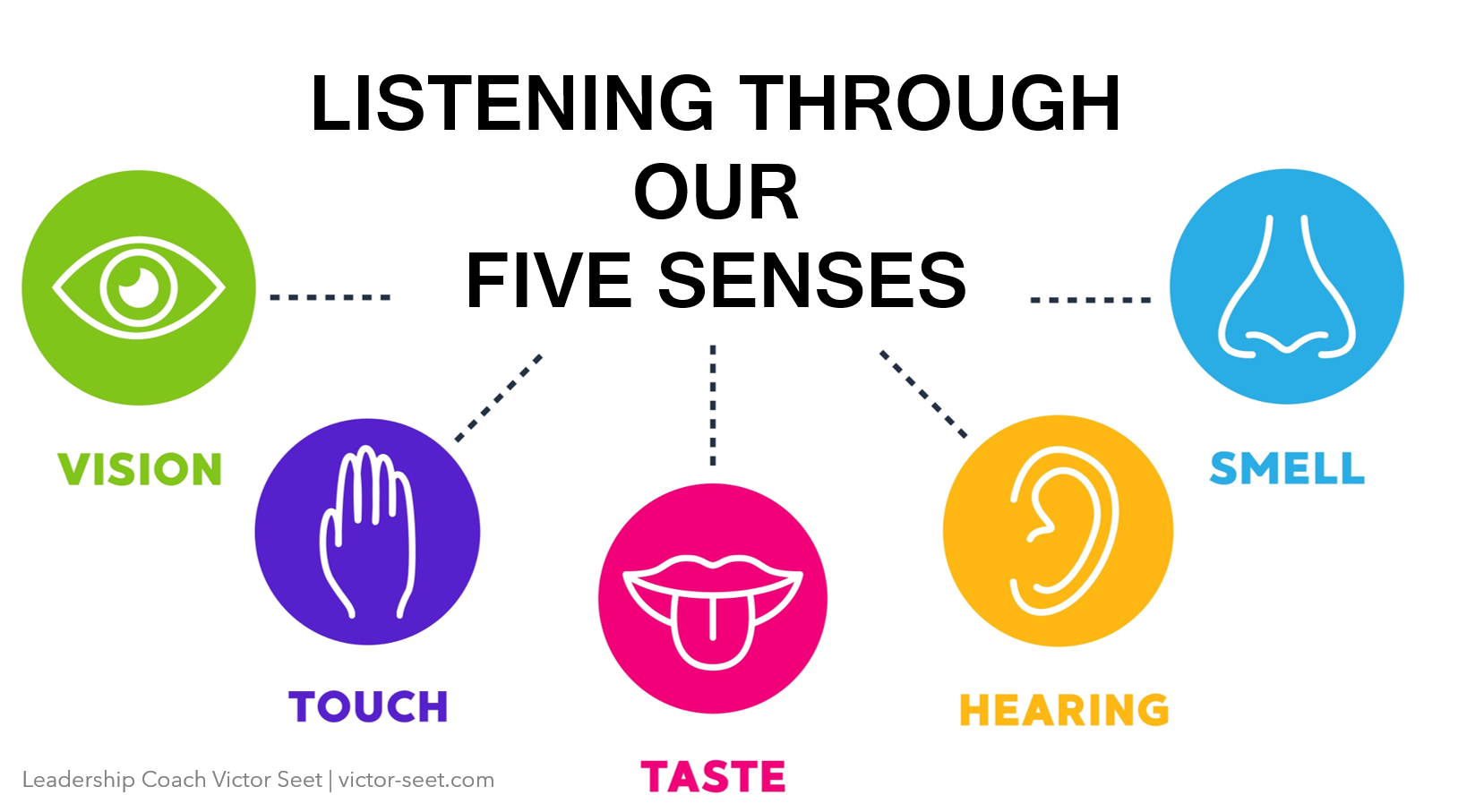Listening Through Our Five Senses
I want to boldly suggest that the digital world has created a shift in the kind of leaders and communicators we need. In this digital world, we are having information overload. There are no lack of great speakers presenting information to us. We have easy access to Ted and videos of great speakers through YouTube. We have easy access to insightful podcasts on Spotify and Podbean. We receive so much information each day from others and that potentially creates a big vacuum - where will we have our voices heard? It is my opinion that as a society, we now desire to have great listeners much more than great speakers because of the need for our voice to feel heard. I anticipate that society as a whole will value a new way of being - a Listener. I wrote about this briefly in an earlier article on dealing with mental health.
This article is written on the premise of growing as a listener. As an ontological coach, I am learning that “we hear with our ears and we listen with our body”. This concept has a profound impact in the way I understand listening. I realized how powerful our five senses (vision, smell, hearing, taste, touch) can help us engage in deeper listening.
Let me provide some examples and practical strategies.
Smell:
When we smell something, our emotional state shift. That impacts our listening. For example, when we smell something foul, we could experience the emotion of disgust or frustration or resentment. When we smell something nice, we could experience the emotion of calmness or curiosity or joy or even playfulness. Many people have turned to aromatherapy and used diffusers to enhance the environments they are in to brighten their emotions and moods. For someone like myself who often engage in conversations in the car, I make sure the interior of my car smells nice by using car scents. The nice smell impacts my emotional state and makes me a better listener.
Given that more and more people are working from home, setting up an environment that smells great can make us better listeners to our stakeholders as well while we are on virtual meetings. Such a strategy to improve effective communication, while seemingly intangible, is worth considering. We cannot control how others speak. We can however enhance our environment to be better listeners.
Vision (Sight)
Listening is powerfully affected by what we see. When we get distracted by what we see, we find it hard to listen. On the flip side, the ability to observe ourselves on virtual platforms like Zoom or MS Teams has provided us with an opportunity to improve our listening. With virtual platforms, we are now able to see ourselves in a mirror-like manner and notice exactly what the other person is seeing. And that is powerful for growing our self awareness. Observing how our expressions change during conversations, noticing our default sitting postures etc, can be very insightful if we want to grow as listeners. Have you notice how you are sitting and presenting yourself on Zoom? How do your audience perceive your attitude, your enthusiasm, your readiness to engage through your body language? The ability to observe ourselves during conversations can be a great game changer.
Hearing (Sound)
We hear what people speak and the tone of voice they use. My assessment is that while many of us might be aware of the language and words we are using in a conversation, the same cannot be said about our tonality. Listening to tonality is a much needed practice if we are to grow in our listening. Our tone of voice are usually invisible to us but visible to other parties. In the past, I received feedback based on my tone but brushed the feedback away by rationalizing “this is just how I am. This is just how I speak!” I have since pay more attention to my tone and volume when I’m speaking. I respectfully encourage us to practice noticing our own tone of voice and the impact our tone has on conversations.
For example, a flat tone could mean someone is disinterested or an emotion of boredom might have emerged. Some tones bring energy and could be closely connected to emotions of enthusiasm or resentment, just to name some examples. When we hear a change in tone of voice, that could also mean a shift in the person’s emotional state and that is an invitation to do a check in. With practice, we can skillfully capture the opportunity to do a check in and elevate our effectiveness as listeners. On another note, the absence of sound and complete silence can create a powerful space for thoughts and emotions to connect during a conversation. Being comfortable with silence is another skill that hones our senses and produce powerful listening.
Taste
Many conversations happen around eating and dining. Many negotiations and important conversations take place around food. The taste of the food has the potential to change our emotional state and change the direction of the conversation.
Consider this scenario:
A waiter showed up with a delicious looking steak. Putting that mouth watering steak into your mouth and tasting it will almost immediately shift your emotions positively. Now add the experience of having a great bottle of wine to go along with the steak, your mood will likely brighten up further. You immediately become a new kind of listener (though this shift might be totally invisible for you).
Now consider another scenario: you took a bite of the fish on your plate only to experience a particular fishy taste lingering in your mouth long after it was consumed. The listening during this particular meal now becomes affected by the emotional state created by the lingering fishy taste.
As a Singaporean who loves to eat, I’m now more aware of how food can change conversations and more intentional to leverage the use of taste when holding important conversations.
Touch
Stroking a pet can bring certain emotions to pet owners and can possibly be a calming influence in conversations. Receiving a tender touch from another human being can evoke lots of powerful emotions as well. Leveraging the power of touch can be very powerful especially for parents with young children. When we communicate that we are listening to our young kids through physical touch, we create a huge amount of psychological safety (this aspect is intangible). As a parent, I’ve lost count of the number of times I have demonstrated that I’m listening to my kids by simply holding their hands, touching their faces, massaging their arms and shoulders etc. I have also learnt to calm my kids down by stroking their arms, stroking their backs, brushing my hands on their hair. This way of communication has worked marvelously for me since I started practicing. Touch is a key listening tool in parenting.
In summary: Have we considered how the global shift to more virtual meetings has amplified the need to listen well? To increase in leadership effectiveness and personal performance, we can practice tuning into our five senses. By paying attention to our senses, we can be more aware of our emotional state and become more effective as listeners.
Written by Victor Seet
Activator • Communication • Strategic • Self-Assurance • Command
As a Gallup and Newfield Certified Leadership Coach in Singapore, Victor is passionate about helping people be better observer of themselves to achieve the results they want, especially in the area of well-being and performance. Victor intentionally integrates the strengths-based and ontological approach into his leadership coaching and workshops.

